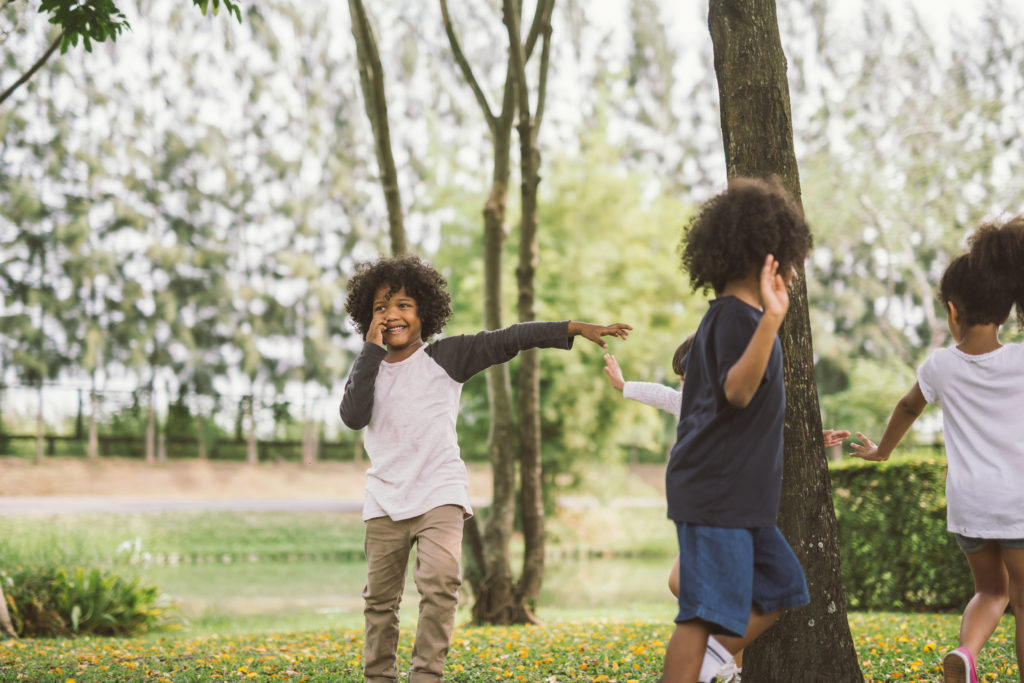
So, a simple cheap way to help your kids improve all life skills and strengthen mental wellbeing. Too good to be true?
Well, this piece of research, just out, finds a fascinating correlation with mental health and kids. This correlation was also surprising – some things kids do, and their personality traits, we can assume could be related to positive mental health. Traits such as extraversion meaning you are likely to bond closer to people and hence this can provide support networks. So, what did these researchers around Helen Dodd from the University of Essex in the UK find?
The researchers surveyed 2’346 parents pre covid and during the first covid lockdown in the UK with questions on general mental health and mood. They found that those kids who spend more time playing outside in more unstructured and adventurous games had fewer “internalising” problems i.e. anxiety and depression during the first covid lockdown.
What’s more this effect was more pronounced in children from lower income families.
This highlights the importance of play – I have written in other places of how beneficial play is for multiple reasons. Basically, it is one of the best ways to build your brain. But importantly it is free and actually easily accessible for most people.
Adventurous play according to this also seems to be important because it uses cognitive skills that are very important such as exploration but also risk balancing and likely also failure and recovery and trying again. Critical life skills – but this also seems to have a buffer against mental health issues and that is really important to note.
This shows that some of things we can do as a society are cheap and easily accessible – but society can also encourage this through giving access to parks and well-designed play areas.
So as a parent you should be encouraging your kids to get out and play – and hey, there’s nothing wrong with you adults doing it also!

Andy Habermacher
Andy is author of leading brains Review, Neuroleadership, and multiple other books. He has been intensively involved in writing and research into neuroleadership and is considered one of Europe’s leading experts. He is also a well-known public speaker speaking on the brain and human behaviour.
Andy is also a masters athlete (middle distance running) and competes regularly at international competitions (and holds a few national records in his age category).
Reference
Helen F. Dodd, Rachel J. Nesbit, Lily FitzGibbon.
Child’s Play: Examining the Association Between Time Spent Playing and Child Mental Health.
Child Psychiatry & Human Development, 2022;
DOI: 10.1007/s10578-022-01363-2
More Quick Hits
Vaccination to Keep Your Memory?
Quick HitsDaily brief research updates from the cognitive sciences ho wouldn’t want to keep their memory when aging?! Well, researchers have just announced some promising results in mice enabling them to keep their memories and avoid some of...
Can Having More Children Reduce Cognitive Functioning?
Quick HitsDaily brief research updates from the cognitive sciences aving more children and late life cognition is not something that is generally researched. There are more obvious avenues such as diet, education, exercise, or socio-economic...
How Sleep Helps Your Brain Manage Fear
Quick HitsDaily brief research updates from the cognitive sciences leep on i” is common advice for many reasons. Often to consolidate thoughts and help boost creativity. This is a well-known effect. We also know that sleep is the time that helps to...
Video games can boost children’s intelligence
Quick HitsDaily brief research updates from the cognitive sciences ell, this is not the answer many of us would expect, and it goes against other logic of spending more time doing other things such as reading or socialising with friends...
Just how many people get COVID brain?
Quick HitsDaily brief research updates from the cognitive sciences here are many questions still open about COVID and the brain. There is no doubt that long COVID exists, and this can have dramatic impacts on people’s lives. But just how...
Brain networks and losing weight – successfully or not
Quick HitsDaily brief research updates from the cognitive sciences s weight loss all in the mind? Well, with the danger of oversimplifying a complex topic, this latest research shows it is, and shows precisely how and with what networks. So,...
Reversing aging – with poo!
Quick HitsDaily brief research updates from the cognitive sciences ho wouldn't want to age better - well the results of an unsual study are in and the results are promising and may make many of you who are aging prick up your ears. The...
Brisk walking slows biological aging
Quick HitsDaily brief research updates from the cognitive sciences f you want to age better, then walk quicker, or those who walk quicker, age slower. That is the result of a recent study of 400,000 UK adults mapped to genetic markers of age...
Learning at double-speed?
Quick HitsDaily brief research updates from the cognitive sciences ouldn’t it be great if we could learn things double speed? Well, maybe we can. At least according to a study out of the University of California. During the pandemic many...
The “drunken monkey” hypothesis – proven
This had to be a story I covered – monkeys and alcohol sounds too good to pass up. But this is also linked to the “drunken monkey” hypothesis: that humans developed their love for alcohol in earlier primitive times accidentally, and then intentionally, eating fruit...










